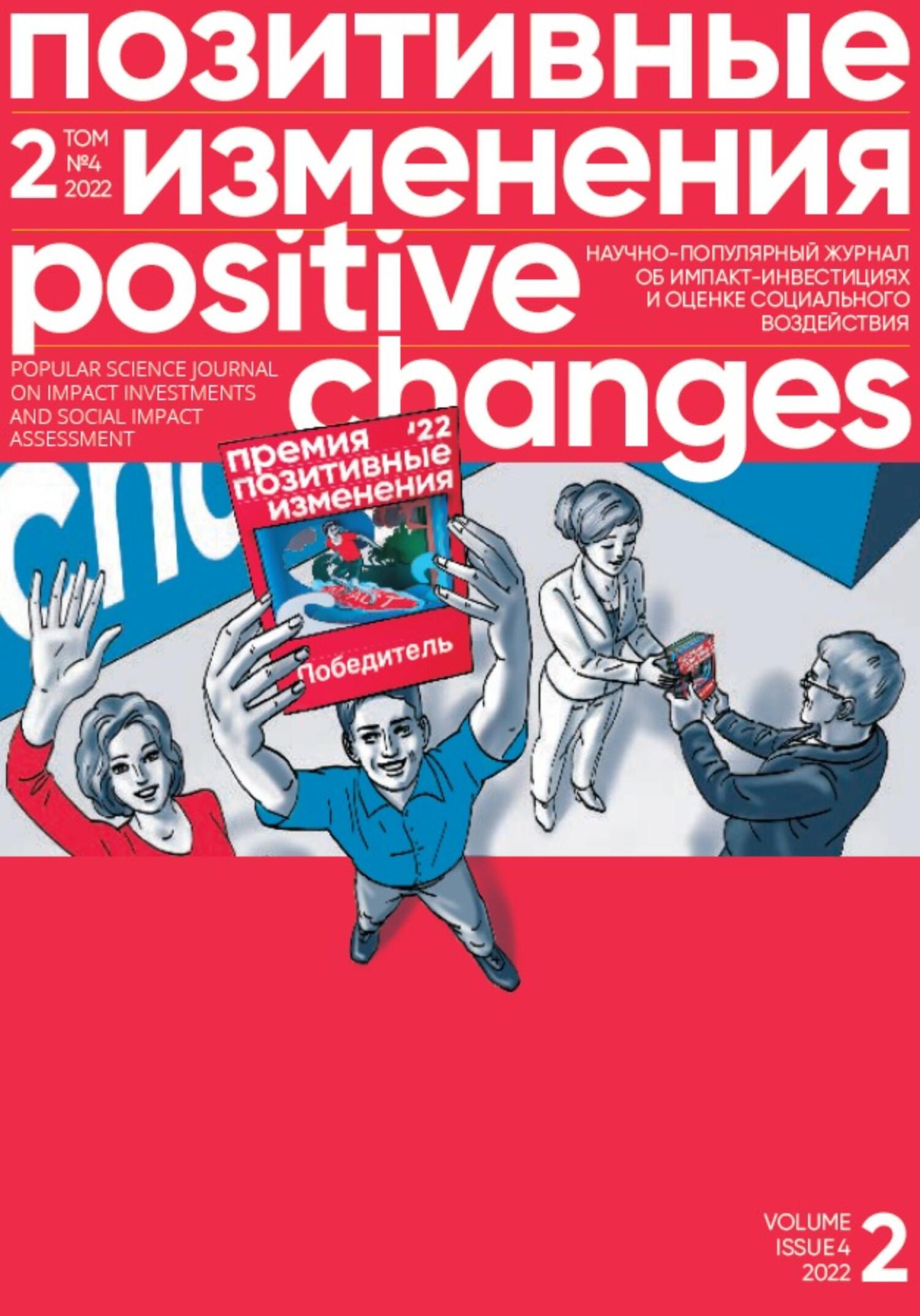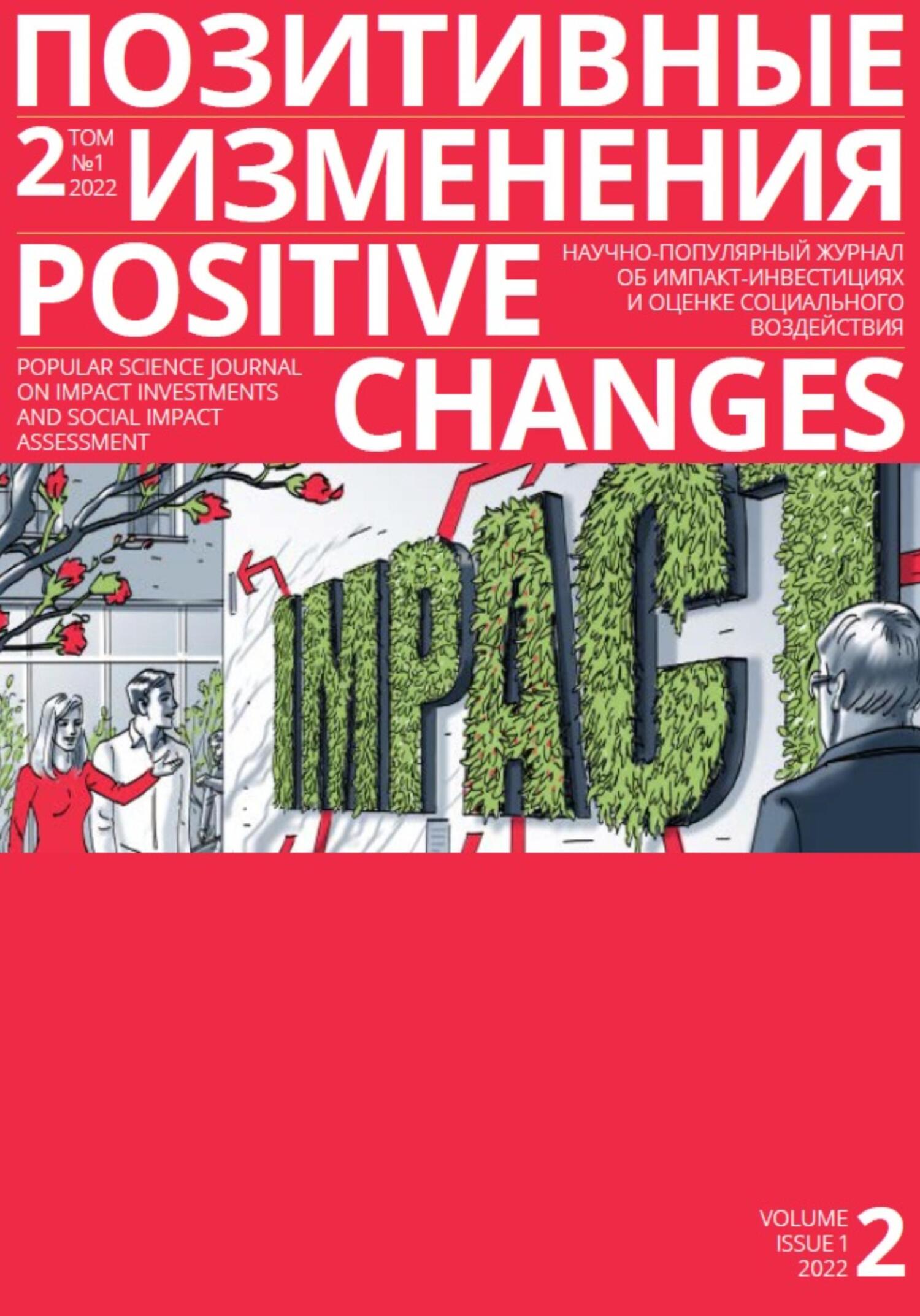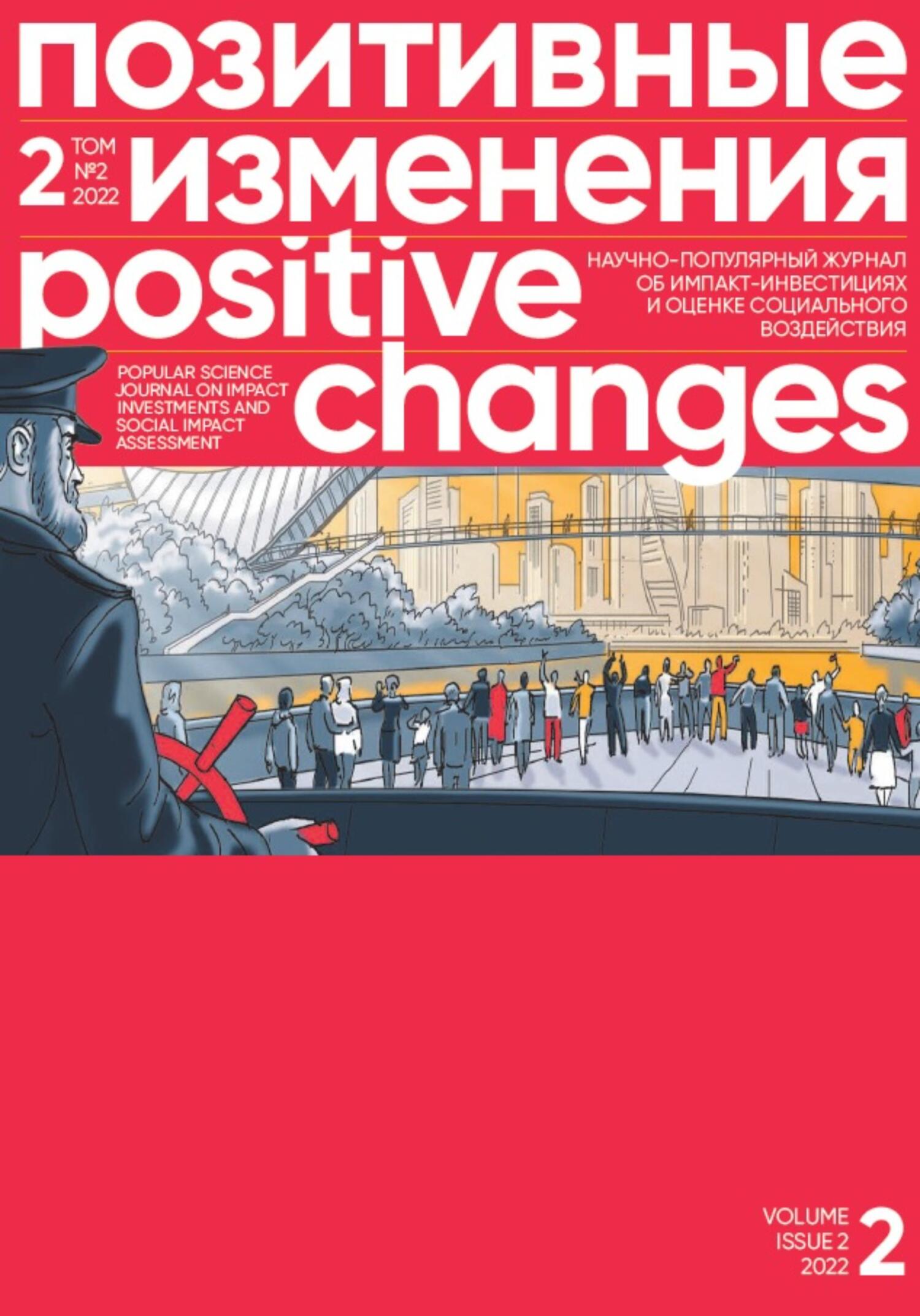Читать книгу - "Позитивные изменения. Том 2, № 3 (2022). Positive changes. Volume 2, Issue 3 (2022) - Редакция журнала «Позитивные изменения»"
Аннотация к книге "Позитивные изменения. Том 2, № 3 (2022). Positive changes. Volume 2, Issue 3 (2022) - Редакция журнала «Позитивные изменения»", которую можно читать онлайн бесплатно без регистрации
Журнал «Позитивные изменения» — профессиональное издание, в котором отражаются результаты новейших исследований в оценке социально-экономического воздействия, импакт-экономики, фундаментальных и прикладных исследований. Журнал, в первую очередь, имеет практическую направленность и публикует статьи ведущих специалистов, освещающих актуальные проблемы импакт-экономики, модели и алгоритмы оценки социально-экономического воздействия. В нем публикуются передовые и оригинальные статьи, краткие сообщения, заметки из практики, лекции и обзоры. Мы стремимся развивать принцип междисциплинарного подхода, делаем все возможное, чтобы наши читатели были в курсе современных достижений науки и практики, помогаем исследователям и предпринимателям в освоении современных принципов социальных инвестиций и повышения их эффективности.
For factor 4, we can also recognize a trend common to the first two factors, that is a more positive characterization of the image of a social entrepreneur in the United States and “under perfect conditions,” compared to the characteristics that respondents applied to their home country and “other countries.” As we can see, respondents from Belarus generally do not describe social entrepreneurs in their country as supported by the state and the church. Their estimates differ significantly from those of the respondents from Russia (p <0.001) and Kazakhstan (p = 0.001). The respondents from these two countries also gave positive ratings to this factor, with a level above zero. Respondents from Belarus also attribute this characteristic to the image of a social entrepreneur in Russia, and this assessment is significantly different from the Russian (p = 0.023) and Kazakh (p = 0.005) respondents.

Figure 4. Country image scores for factor 4 “Not supported by the state and the church”
CONCLUSION
Based on our analysis of the findings, the following main conclusions can be drawn:
1. There are four main factors in assessing the image of the social entrepreneur in each of the three countries: Kazakhstan, Belarus and Russia. These factors are;
• An effective entrepreneur creating social value, offering an innovative solution to a social problem with the support of foundations, investors, and the public;
• Dependent on outside funding, weak business, not supported by the state and society, unhappy person;
• More of a commercial rather than social entrepreneur, an unsuccessful businessman; a loner, working without a team;
• Not supported by the state and the church.
2. Images of social entrepreneurs in the CIS countries — Russia, Kazakhstan and Belarus — have significantly different properties from the definition of social entrepreneurs in the United States and social entrepreneurs “under perfect conditions.” In general, the social entrepreneurs of their own and other CIS countries are described as “weaker,” that is, less effective and less innovative; they depend on external funding and are not supported by the government, the public, and the church. The respondents rated the image of a social entrepreneur in the United States as much closer to the “perfect” conditions than in each of the three countries surveyed.
3. There is a specific characteristic inherent in the image of social entrepreneurs in the United States. According to the respondents, it is “profit-oriented,” that is, their activities are more commercial than social. Conversely, study participants from Russia and Belarus believe that social entrepreneurs in their countries are more focused on social outcomes and solving social problems. Meanwhile, respondents from Kazakhstan believe that social entrepreneurs are more profit-oriented in all three countries.
4. Social entrepreneurs from Belarus mostly rate the image of a social entrepreneur in their country as “weak”. They give the lowest scores (compared to other respondents) to their country on factor 1 (“An effective entrepreneur creating social value, offering an innovative solution to a social problem with the support of foundations, investors, and the public”), and the highest for factor 4 (“Not supported by the state and the church”). But they also describe the image of a social entrepreneur in their home country as not fitting strongly with the description “More of a commercial rather than social entrepreneur, an unsuccessful businessman; a loner, working without a team” than respondents from other countries.
5. Among the CIS countries that participated in the study, Russian respondents are more positive about the image of a social entrepreneur in their country than respondents from Belarus and Kazakhstan assessing the situation in their respective home countries (this is especially evident in the analysis of factors 1 and 4).
6. In general, respondents from Russia, Belarus and Kazakhstan have similar views on the image of a social entrepreneur in relation to each of the objects: their home country, the United States and the “perfect country.” The respondents had different views (especially when evaluating their home countries) with respect to the property “More of a commercial rather than social entrepreneur, an unsuccessful businessman; a loner, working without a team.” “More social” is the image of a social entrepreneur in their home country, according to Belarusian respondents. “More commercial” is the image of a social entrepreneur in Kazakhstan, according to Kazakh respondents.
7. Social entrepreneurs from all three countries tend to attribute the characteristic “Not supported by the state and the church” to the image of a social entrepreneur in their home country and other CIS countries (Russia for Kazakhstan and Belarus, and Kazakhstan for Russia). Conversely, “Supported by the state and the church” for social entrepreneurs in the U. S. and “under perfect conditions.”
8. Social entrepreneurs from the three countries tend to attribute the property “Dependent on outside funding, weak business, not supported by the state and society, unhappy person” to the image of a social entrepreneur in their home country and other CIS countries (Russia for Kazakhstan and Belarus, and Kazakhstan for Russia). The opposite is attributed to the image of social entrepreneurs in the United States and entrepreneurs “under perfect conditions.”
APPENDIX 1. EXAMPLE OF A QUESTIONNAIRE FORM
Dear ______,
You are invited to participate in a public opinion survey on social entrepreneurship in different countries.
Please rate (on a scale from 0 to 5) the extent to which, in your opinion, a particular statement is typical of a social entrepreneur in each of the countries listed below. Place ‘5’ in the respective cell if the quality is expressed to the maximum extent, 0 if the opposite is expressed to the maximum extent. Use ratings 1, 2, 3, 4 to mark values in-between.
Answers are anonymous, but your opinion will describe a holistic picture of the public attitude towards social entrepreneurship in the world.
Thank you very much for your participation!


REFERENCES
1. Mitina, O. V. &
Прочитали книгу? Предлагаем вам поделится своим впечатлением! Ваш отзыв будет полезен читателям, которые еще только собираются познакомиться с произведением.
Оставить комментарий
-
 Гость Алексей04 январь 19:45
По фрагменту нечего комментировать.
Бригадный генерал. Плацдарм для одиночки - Макс Глебов
Гость Алексей04 январь 19:45
По фрагменту нечего комментировать.
Бригадный генерал. Плацдарм для одиночки - Макс Глебов
-
 Гость галина01 январь 18:22
Очень интересная книга. Читаю с удовольствием, не отрываясь. Спасибо! А где продолжение? Интересно же знать, а что дальше?
Чужой мир 3. Игры с хищниками - Альбер Торш
Гость галина01 январь 18:22
Очень интересная книга. Читаю с удовольствием, не отрываясь. Спасибо! А где продолжение? Интересно же знать, а что дальше?
Чужой мир 3. Игры с хищниками - Альбер Торш
-
 Олена кам22 декабрь 06:54
Слушаю по порядку эту серию книг про Дашу Васильеву. Мне очень нравится. Но вот уже третий день захожу, нажимаю на треугольник и ничего не происходит. Не включается
Донцова Дарья - Дантисты тоже плачут
Олена кам22 декабрь 06:54
Слушаю по порядку эту серию книг про Дашу Васильеву. Мне очень нравится. Но вот уже третий день захожу, нажимаю на треугольник и ничего не происходит. Не включается
Донцова Дарья - Дантисты тоже плачут
-
 Вера Попова27 октябрь 01:40
Любовь у всех своя-разная,но всегда это слово ассоциируется с радостью,нежностью и счастьем!!! Всем добра!Автору СПАСИБО за добрую историю!
Любовь приходит в сентябре - Ника Крылатая
Вера Попова27 октябрь 01:40
Любовь у всех своя-разная,но всегда это слово ассоциируется с радостью,нежностью и счастьем!!! Всем добра!Автору СПАСИБО за добрую историю!
Любовь приходит в сентябре - Ника Крылатая





